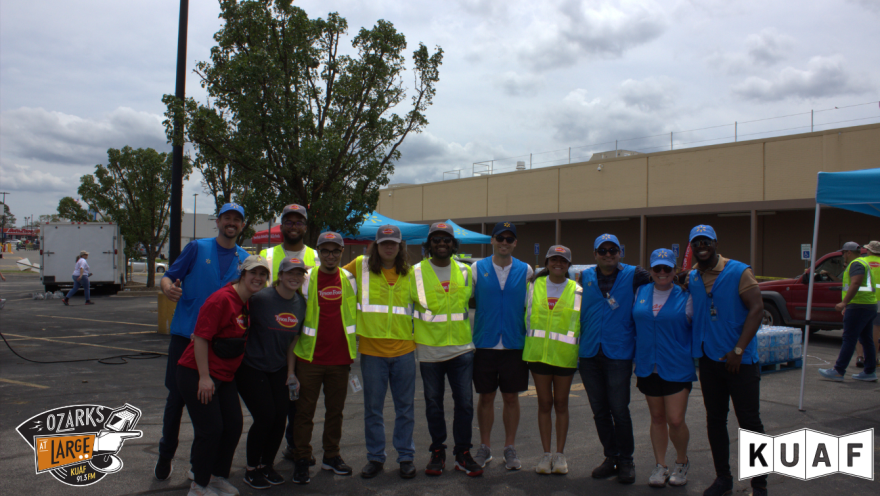A steady flow of cars stream into the parking lot of Rogers High School while students, staff and other community members in yellow hi-vis vests direct traffic and distribute supplies like water, diapers and flashlights as people drive up.
In the days since the tornado, the school on S Dixieland Drive has become a kind of hub for the community offering daily meals, taking and delivering supplies and offering shelter.
Superintendent Jeff Perry said part of that was because the campus maintained power while others went without electric service for several days.
"And then we had a big gym, we've got the area to do that," he said. "We've got 2000 Some employees, we've got 16,000 students, you know, with accompanying parents. And so I think we have the resources, I think we've got the people. And then I think most importantly, we've got people with a servant heart here."
Outside, Willy Wright sits with other RHS staff at a bench behind two foldout tables stacked with sack lunches. The RHS wrestling coach said he couldn't imagine not helping out during this crisis.
"We've been volunteering the last three days," he said. "Just kind of picking up debris and cutting trees and stuff like that, and just helping the community around us. That's kind of our main main goal and."
Wright said serving those impacted by the storm is important to helping the community heal from the traumatic event, and he said, it is especially important for his students to be directly involved in that relief effort.
"I think we've had about 25 kids of our team show up every single day consistently from eight to 12," Wright said. "And just knock it out people's yards and help move and trees. And you know, same thing with basketball, football. And then just even people from the community coming out and donating and helping people out that need shelter and stuff like that. So it's I think it's really good effort. I think we're doing great here. And it's gonna be a long process, but I think we're moving the right"
Lori Arnold-Ellis is the executive director for the American Red Cross of Greater Arkansas, and she said almost immediately the best instincts of people in this region kicked in.
"I do want to just say how incredible the community has been in Northwest Arkansas around this tornado," she said. "Everybody has come together, everybody is doing our part and helping out. And that's what we love to see with the Red Cross. We love the neighbors helping neighbors and we are here to support them too. And however we we can do that."
The Red Cross has been working with local governments, state and county Emergency Management and others to ensure needs are being met. The group is still operating respite centers in Decatur and Yellville.
"What we're finding right now is a lot of people just need something to eat, they need some cleanup supplies," she said. "You know, it takes a village... what we're focused on right now is those respite centers and we are doing damage assessment. That way we can actually help people with some direct financial assistance for those whose homes have been really destroyed from this tornado."
And for many vulnerable communities the damage is often compounded. Stephanie Takamaru is with the Arkansas Coalition of Marshallese and said at least 25 Marshallese households were destroyed by the storm and many of those are multi-generational homes.
"Having them being displaced out of the house and trying to still continue to work and provide for the family," she explained "And now they're living with other family members. That's a lot of people in one household."
Luckily, she pointed out, under the latest federal agreement Marshallese in the U.S. will be eligible for federal assistance from the storm. But in the meantime, those impacted are having to rely on local aid for food assistance, housing and basic needs.
"So it's really does impact us because you know we migrated here for a better life and for a better future," Takamaru said. "And with this tornado it's putting us on a standstill right now."
Takamaru says the Coaltion mobilized almost immediately after the tornadoes hit to deliver critical aid and money to those in need.
And while there is no shortage of places to donate or to volunteer - just search tornado relief Arkansas on Facebook and several community groups pop up with donation needs to clean-up opportunities, Arnold-Ellis said before you offer help check that what you are offering is actually what people need.
"They should call ahead first to find out if those are necessary," Arnold-Ellis said. "We get a lot of donations during times like this. And it's a lot for many nonprofits to handle because we aren't equipped always for a large donation of, say winter coats when it's the middle of summer, that kind of thing."
AJ Gary is director of the Arkansas Division of Emergency Management and said anyone doing volunteer clean-up, especially if you are using heavy equipment like chainsaws or front-end loaders should coordinate with the local emergency management division.
"They have a better idea of which parts of the impacted area that they need those resources at," He said. "I know we have groups up there that are are helping to clear debris. So they need to coordinate that with our local emergency management so that we know they're there. So that the local emergency management know that they're there in the area and doing the volunteer work."
Arnold-Ellis encouraged people to first check with people they know locally to see what ways they can help directly, then go to trusted or established organizations.
Jeff Perry with Rogers Schools said they have a list of needed items updated on their website and Facebook page each day, he also says volunteers - especially those who speak Spanish or Marshallese - are needed to sort donations and direct people.
"For next week, we're still going to give out supplies, we're still going to do food, [but we will] probably start transitioning from distribution of things, to coordination of services going into the community," Barry said. "Helping folks clean up and helping them get back on their feet, you know, doing some of those kinds of things."
Arnold Ellis said the most important work will be in the coming weeks as the emergency cools and attention shifts.
"We are really just getting started and we could be here for you know, a couple of weeks or it could be longer we really don't know," she said. "I can tell you that we're not going anywhere right now."
Ozarks at Large transcripts are created on a rush deadline by reporters. This text may not be in its final form and may be updated or revised in the future. Accuracy and availability may vary. The authoritative record of KUAF programming is the audio record.








